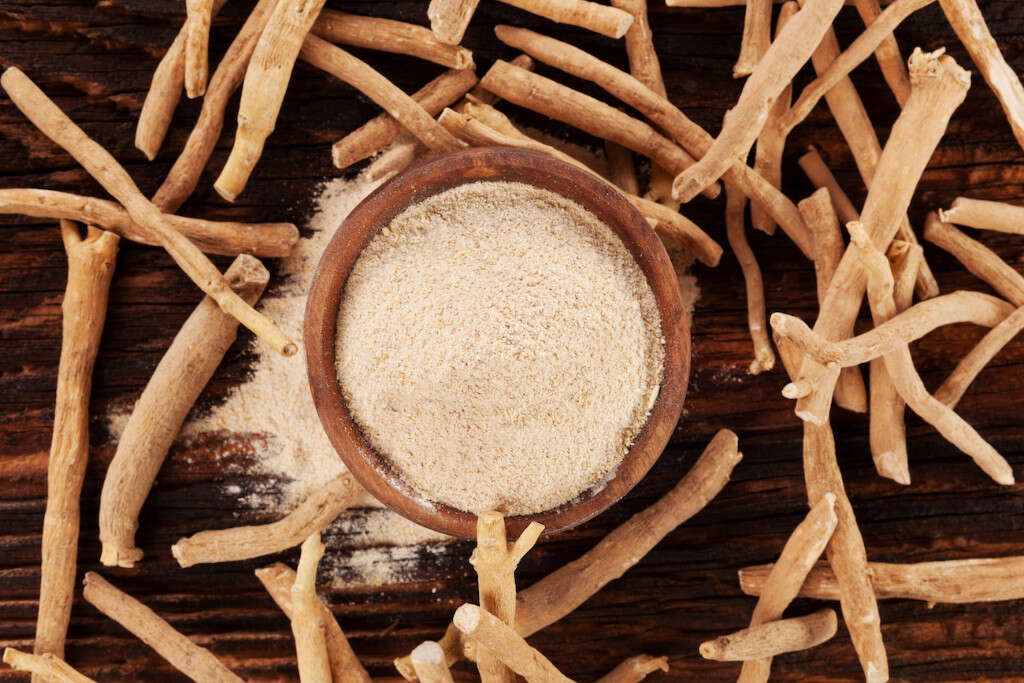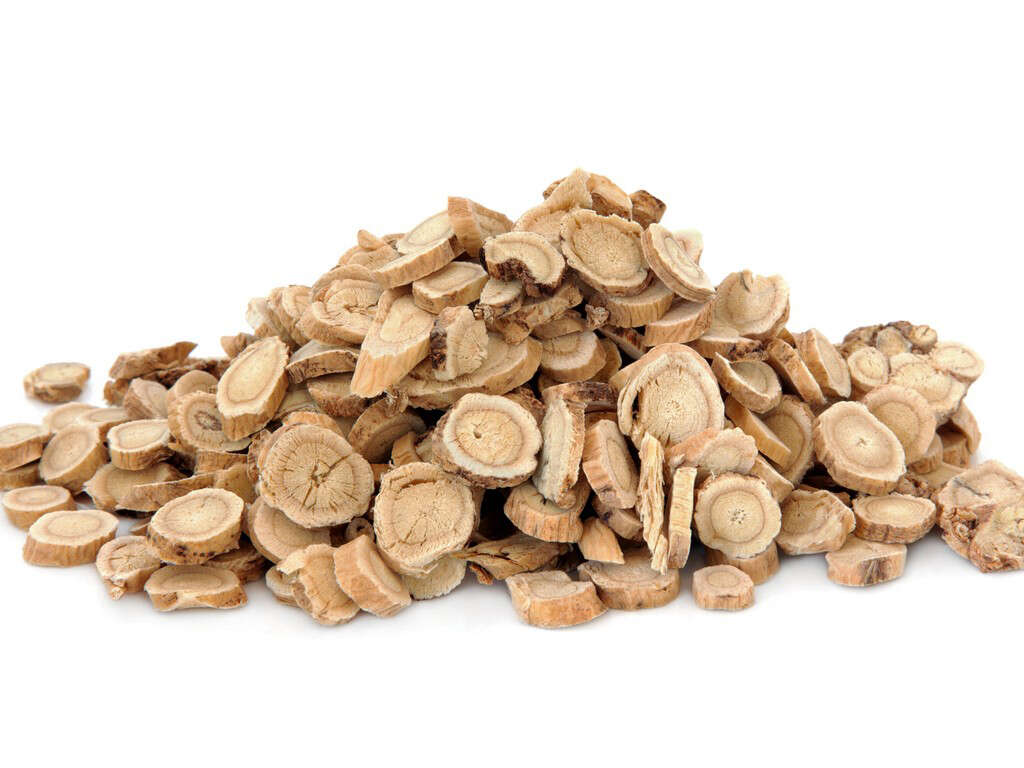10 Benefits of Ashwagandha
Ashwagandha is considered an adaptogen, a nontoxic medication that normalizes physiological functions that have been disturbed by stressors. It corrects imbalances in the immune system while also decreasing inflammation. It has several health benefits for the body and brain. For example, it can reduce cortisol, boost brain function and balance blood sugar.
Ashwagandha is one of the most significant herbs in Ayurveda, a form of Indian medicine based on natural healing. “Ashwagandha” means “smelly horse” because it has a foul smell, yet it has an ability to increase strength. The plant has yellow flowers and extracts are made from the root leaves to treat a variety of conditions.

Ashwagandha Benefit #1: Anti-Inflammatory
Ashwagandha has anti-inflammatory properties. In one study, it was found to stimulate immune activity such that it was able to increase cell activity in mice. Ashwagandha extract showed the ability to proliferate lymphocytes, bone marrow cells and thyme cells in mice. It increases the expression of cells that have been depleted through stress, such as the T-cell population in chronically stressed mice.
The herb also was able to show the enhanced activity of macrophages in animals. Many suggest that Ashwagandha increases TH1 cells, acting as an immune “balancer” without any of the side effects 1https://www.ncbi.nlm.nih.gov/pubmed/10904163.

Ashwagandha Benefit #2: Reduces Anxiety/Stress
Ashwagandha, in tonic form, is used to calm nerves. The extracts have been shown to be useful in anxiety disorders for the practice of psychiatry. The root extract of the herb was able to improve stress levels in humans, at a high concentration. Therefore, it is also able to improve quality of life in humans.
Ashwagandha also decreases cortisol, a hormone released by the body when stressors are present. Cortisol contributes to hormonal imbalances, muscle weakness, cognitive impairment and aging. It is considered a mood stabilizer for anxiety and depression, and it has also been proven to effectively treat obsessive compulsive disorder. Ashwagandha also reduces chronic stress-induced ulcers.

Ashwagandha Benefit #3: Fights Cancer
Ashwagandha has shown to fight against cancer-related fatigue, thus improving the quality of life for cancer patients. It is considered to be a potent and relatively safe chemotherapeutic agent. Ashwagandha increases the number of white blood cells in the body, which are typically depleted when patients are receiving chemotherapy.
In one study, Ashwagandha inhibited the growth of cell migration of human breast cancer cells. It thus significantly reduced the rate at which cells divided in breast tumors. The mechanism by which it was able to help breast cancer patients is by activation of STAT3 in human breast cancer cells.

Ashwagandha Benefit #4: Heart Health
Ashwagandha exhibits favorable effects on the heart. After using the herb as treatment, it was found to increase the heart’s rate, contractility and relaxation. Ashwagandha reduces blood pressure by blocking the autonomic ganglion. It has a profound effect on reducing cholesterol, thus preventing the hardening of the arteries.
When given .75 gms/day to rats with high cholesterol, Ashwagandha decreased triglycerides significantly. Some studies have shown that it also improves the cardiorespiratory endurance of athletes and shows protective effects in ischemic stroke in rats. Supplementing with Ashwagandha and milk is recommended in order to treat stress-related hypertension.

Ashwagandha Benefit #5: Helps Fight Diabetes
Ashwagandha can alter blood and glucose levels in favor of reducing symptoms of diabetes. Hemoglobin A1C and liver enzymes have proven to improve in one study done on rats. Ashwagandha root induces low blood sugar for those with type 2 diabetes and reduces blood glucose in diabetic rats.
When combined with Shilajit extract, Ashwagandha had shown a considerable reduction in symptoms related to diabetes. Fasting blood sugar reduced and cholesterol profiles improved in human subjects. Ashwagandha also prevents excess insulin levels, which helps cells become less insulin resistant and more likely to take up glucose for energy. Ashwagandha shows strong activity with free radicals and helps improve antioxidant status for those with diabetes.

Ashwagandha Benefit #6: Women’s Health
In one study, Ashwagandha was one of the components of an Ayurvedic supplement and showed significant relief for patients with Polycystic Ovarian Syndrome. Ashwagandha has also proved to treat amenorrhea, which is when a woman goes an abnormal period of time without menstruating. Using the herb long-term has shown to improve uterine fibroids that develop in the walls of the uterus. Some studies suggest that it is also effective in managing menopausal symptoms and stimulating hormone secretion.
It has also been used in the treatment of infertility. Ashwagandha has been known to help restore male reproductive health. It can balance hormones and improve fertility by promoting relaxation and decreasing stress. It increases the luteinizing hormone towards normal in males who are infertile and increases testosterone as well. It improves the function of the thyroid gland, which helps with hormone regulation.

Ashwagandha Benefit #7: Promotes Bone Health
Ashwagandha has shown to stimulate bone formation by acting as a bone building agent. When supplemented, it improves calcium levels without any adverse effects. In one study, the leaves of Ashwagandha were used to preserve bone loss in mice. It showed to stimulate new bone formation, which is beneficial in preventing the onset of osteoporosis.
Ashwagandha also suppressed gouty arthritis in rats. The water extract of the root powder has shown to have positive effects in those who suffer from arthritis, thus preventing its worsening. In one study, Ashwagandha improved the productive performance in hens due to its benefits affecting the calcium and phosphorus levels of the tibia bone.

Ashwagandha Benefit #8: Gut Health
Ashwagandha significantly increases the amount of bile acid produced in the liver of rats. It also decreases circulating liver enzymes, restoring them to normal levels. This is especially beneficial with those who have compromised liver function due to diabetes or hormonal imbalances.
An enema of Ashwagandha water extract is prescribed for intestinal ulcers or irritable bowel syndrome. Water extracts have shown to restore the mucous of the lining of the gut in rats with inflammatory bowel disease. Ashwagandha can also prevent constipation and be used to treat hemorrhoids found in the lower rectum.

Ashwagandha Benefit #9: Increase Muscle Mass
Research suggests that Ashwagandha supplements significantly increase muscle mass and strength in men and may be beneficial for males who are practicing resistance training and weight bearing exercises. Ashwagandha has also been effective in treating the elderly who have lost muscle mass due to their age.
In one study on the safety and effectiveness of Ashwagandha for healthy men, 750-1250 mg per day resulted in increased muscle mass after 30 days. The difference in muscle mass was significant and more than doubled the reduction in body fat percentage compared to the placebo.

Ashwagandha Benefit #10: Lower Cholesterol and Triglycerides
Several animal studies suggest that Ashwagandha can improve heart health by lowering cholesterol and triglycerides. One study found that it lowered total cholesterol by as much as 53% and triglycerides by 45% in rats. When the herb was studied on humans, the results were less dramatic than that of rats. Nevertheless, they observed significant and impressive improvements in these blood fats.
One study done on humans examined chronically stressed adults. The group taking the highest dosage experienced a 17% decrease in “bad” LDL cholesterol and an 11% decrease in triglycerides, thus reducing their risk of heart disease and metabolic syndrome 2https://www.ncbi.nlm.nih.gov/pubmed/16713218.












